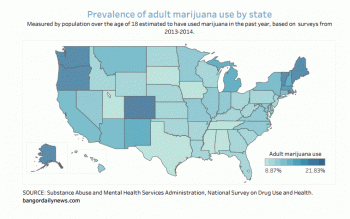
Investors File Class Action Lawsuit Against Weedmaps
Introduction
The cannabis industry has witnessed significant fluctuations since the election of President Trump, both in market dynamics and regulatory landscapes. One of the most notable developments is the class action lawsuit initiated by investors against WM Technology Inc., commonly known as Weedmaps. This lawsuit raises important questions about corporate governance, transparency, and the responsibilities of publicly traded companies in the rapidly evolving cannabis sector. In this article, we will delve into the details of the lawsuit, its implications for Weedmaps and its investors, and the broader context of the cannabis industry.
Background on Weedmaps
Weedmaps was founded in 2008 as a platform to connect consumers with cannabis retailers. Over the years, it has evolved into a comprehensive resource for cannabis-related information, offering services such as dispensary listings, product reviews, and educational content. The company went public in June 2021 through a merger with a special purpose acquisition company (SPAC), taking advantage of the growing acceptance of cannabis in various states across the U.S.
Growth and Market Position
Weedmaps quickly established itself as a leader in the cannabis technology space. With millions of monthly active users (MAUs) and partnerships with numerous dispensaries, it positioned itself as an essential tool for consumers navigating the complex cannabis market. However, this growth has been accompanied by scrutiny regarding its business practices and financial disclosures.
The Allegations
-
Misleading Statements
The crux of the class action lawsuit revolves around allegations that Weedmaps provided misleading statements regarding its user metrics. Investors claim that the company inflated its MAU numbers to create a false impression of its market performance. This inflation allegedly misled investors about the company’s growth trajectory and overall health, leading to substantial financial losses when the truth emerged.
-
SEC Settlement
In September 2023, Weedmaps reached a settlement with the Securities and Exchange Commission (SEC) over these allegations. The company agreed to pay $1.5 million to resolve claims that it had violated federal securities laws by misrepresenting its user metrics. The SEC’s findings indicated that Weedmaps had overstated its MAU figures to create an illusion of robust growth, which ultimately misled investors.
The Class Action Lawsuit
-
Filing Details
The class action lawsuit was filed in October 2023 in a federal court, representing investors who purchased shares during specific periods when Weedmaps allegedly made misleading statements about its MAU numbers. The plaintiffs are seeking damages for their financial losses incurred as a result of these misrepresentations.
-
Legal Grounds
The legal grounds for this class action include violations of federal securities laws, specifically claims related to fraud and misrepresentation. Investors argue that they relied on the inflated user metrics when making their investment decisions, which ultimately led to significant financial harm when the truth about Weedmaps’ performance came to light.
-
Potential Outcomes
The outcome of this class action lawsuit could have far-reaching implications for Weedmaps and its investors. If successful, it may result in substantial financial penalties for the company and its executives, as well as increased scrutiny from regulators. Additionally, a ruling against Weedmaps could set a precedent for other companies in the cannabis sector regarding transparency and accountability.
Implications for Investors
-
Financial Impact
For investors who participated in this class action lawsuit, the financial implications could be significant. If they prevail in their claims, they may receive compensation for their losses, which could help mitigate some of the damage caused by their investment decisions based on misleading information.
-
Investor Confidence
The lawsuit also raises broader concerns about investor confidence in the cannabis industry as a whole. As more companies go public through SPAC mergers or traditional IPOs, transparency becomes paramount. Investors may become more cautious about investing in cannabis-related stocks if they perceive a lack of accountability or integrity among industry leaders.
-
Increased Regulatory Scrutiny
The ongoing legal issues surrounding Weedmaps may lead to heightened scrutiny from regulators not only on Weedmaps itself but also across the cannabis industry. Investors could face increased risks as regulatory bodies may impose stricter compliance measures and oversight, affecting operational costs and growth potential for companies in this sector. This scrutiny could also deter new investments, as potential investors may perceive the cannabis market as unstable and fraught with legal challenges.
The Cannabis Industry Landscape
Regulatory Environment
The cannabis industry operates within a complex regulatory framework that varies significantly from state to state. While some states have embraced legalization for recreational and medicinal use, others remain firmly opposed. This patchwork of regulations creates challenges for companies like Weedmaps that operate on a national scale.
Market Dynamics
The cannabis market has experienced rapid growth over the past decade, driven by changing public perceptions and increasing acceptance among consumers. However, this growth has also attracted scrutiny from regulators and lawmakers concerned about potential abuses within the industry.
Competitive Landscape
Weedmaps faces competition from various players within the cannabis technology space, including other platforms that offer similar services. As competition intensifies, companies must prioritize transparency and ethical business practices to maintain consumer trust and investor confidence.
Corporate Governance Issues at Weedmaps
Accountability Measures
The allegations against Weedmaps highlight potential shortcomings in corporate governance within the company. Effective governance requires transparency, accountability, and ethical decision-making at all levels of an organization. The involvement of multiple executives in misleading practices raises questions about whether adequate oversight mechanisms were in place.
Importance of Transparency
Transparency is crucial for maintaining investor trust and confidence. Companies operating in emerging industries like cannabis must prioritize clear communication with stakeholders regarding their performance metrics and business practices. Failure to do so can lead to severe reputational damage and legal repercussions.
Conclusion
The class action lawsuit against Weedmaps serves as a critical reminder of the importance of transparency and accountability within publicly traded companies—especially in emerging industries like cannabis. As investors navigate this complex landscape, they must remain vigilant about corporate governance practices and demand greater accountability from industry leaders.
As this legal battle unfolds, it will be essential for both investors and companies alike to learn from these challenges to foster a more transparent and trustworthy environment within the cannabis sector. Ultimately, how Weedmaps responds to these allegations will shape not only its future but also influence investor sentiment across an entire industry seeking legitimacy and stability.







